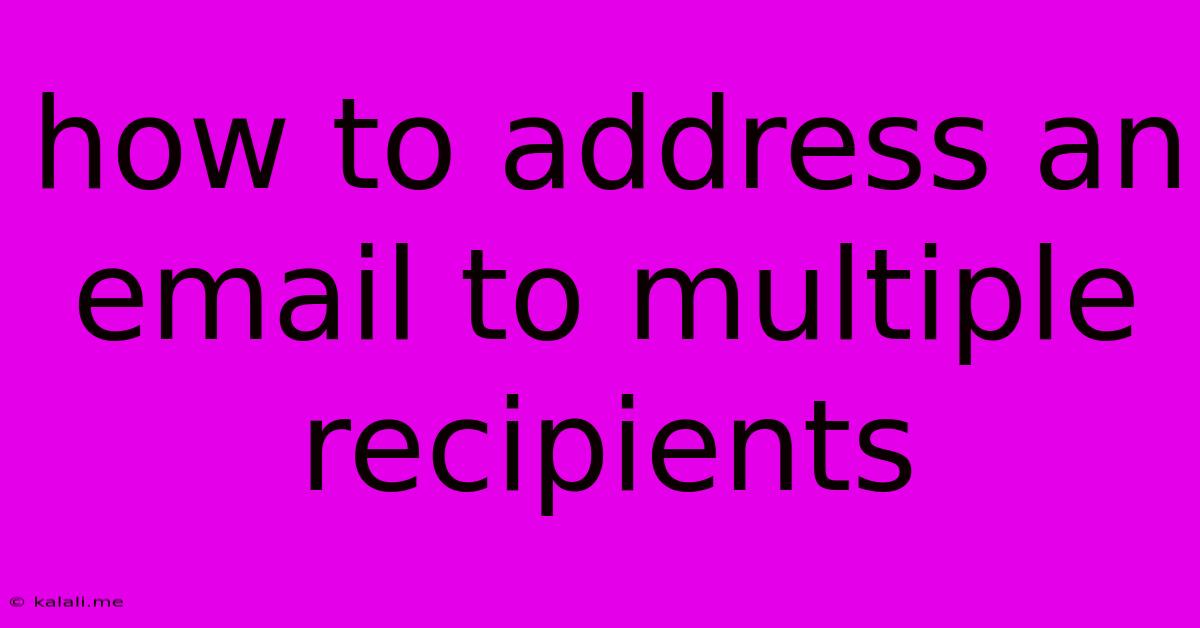How To Address An Email To Multiple Recipients
Kalali
Jun 06, 2025 · 3 min read

Table of Contents
How to Address an Email to Multiple Recipients: A Complete Guide
Sending emails to multiple recipients is a common task, whether you're announcing a company-wide update, inviting colleagues to a meeting, or sending a newsletter to subscribers. However, addressing multiple recipients correctly is crucial for maintaining professionalism and ensuring your message is received and understood as intended. This guide will walk you through various scenarios and best practices for addressing emails to multiple recipients, covering everything from using the "To," "Cc," and "Bcc" fields to crafting the perfect salutation.
This article will cover the best practices for using email to communicate effectively with multiple recipients, focusing on the use of the "To," "Cc," and "Bcc" fields and understanding the etiquette surrounding each. We'll also discuss creating professional greetings and subject lines, as well as avoiding common email mistakes. By following these strategies, you can ensure your emails are received, read, and understood by everyone involved.
Understanding the "To," "Cc," and "Bcc" Fields
The three key fields for addressing multiple recipients are "To," "Cc" (carbon copy), and "Bcc" (blind carbon copy). Each serves a distinct purpose:
-
To: Use this field for the primary recipients – the people who need to directly act upon or respond to your email. Only recipients in the "To" field can see each other's email addresses.
-
Cc: Use "Cc" to keep individuals informed of the email's contents. They are not expected to respond or take action, but they're aware of the conversation. All recipients can see each other's email addresses in this field. Think of it as being copied on a letter.
-
Bcc: Use "Bcc" to send a copy to someone without revealing their email address to other recipients. This is useful for maintaining privacy or sending a copy to your manager for informational purposes without others knowing. Only the sender can see the addresses in the "Bcc" field.
Best Practices for Addressing Multiple Recipients
-
Clarity is key: Always be clear about the purpose of your email in the subject line. A concise and informative subject line will immediately signal to recipients the reason for the email and improve open rates.
-
Personalized greetings: If possible, address recipients individually in the salutation. For example, instead of "Hi everyone," consider "Hi John, Sarah, and team," for smaller groups. For larger groups, a general greeting like "Hi team" is acceptable.
-
Consider the context: The appropriate use of "To," "Cc," and "Bcc" depends on your message and audience. If you are unsure, err on the side of caution and include recipients on the "Cc" field instead of "To."
-
Avoid long lists in "To": For extensive recipient lists, use distribution lists or groups, which makes email management and delivery easier and avoids creating an overly long "To" field.
-
Proofread carefully: Always double-check your email before sending, especially the recipient list, to avoid sending it to the wrong person or causing embarrassment.
-
Use a clear call to action: Make it obvious what you want recipients to do after they have read your email, whether to reply, submit something, or take other action.
-
Respect recipient privacy: Be mindful of including recipients only when necessary. Always obtain consent before including personal email addresses on any mailing list.
Addressing Email to Large Groups
For large mailing lists or newsletters, consider using email marketing services. These platforms provide tools for managing recipient lists, tracking open rates, and ensuring deliverability. They also typically handle the complex aspects of addressing large numbers of recipients effectively and efficiently.
Conclusion
Addressing multiple recipients in an email can feel tricky, but by understanding the nuances of the "To," "Cc," and "Bcc" fields and following the best practices outlined above, you can ensure your emails are clear, professional, and effective. Remember to always prioritize clarity, respect privacy, and proofread before sending. Effective email communication is essential for building strong professional relationships and driving positive outcomes.
Latest Posts
Latest Posts
-
How To Remove Mold From Silicone
Jun 06, 2025
-
Powershell Add A New Column To Ordered List
Jun 06, 2025
-
How Do You Pronounce F E T E
Jun 06, 2025
-
How Long Are Rice Krispies Treats Good For
Jun 06, 2025
-
How To Fix A Scratched Car Rim
Jun 06, 2025
Related Post
Thank you for visiting our website which covers about How To Address An Email To Multiple Recipients . We hope the information provided has been useful to you. Feel free to contact us if you have any questions or need further assistance. See you next time and don't miss to bookmark.